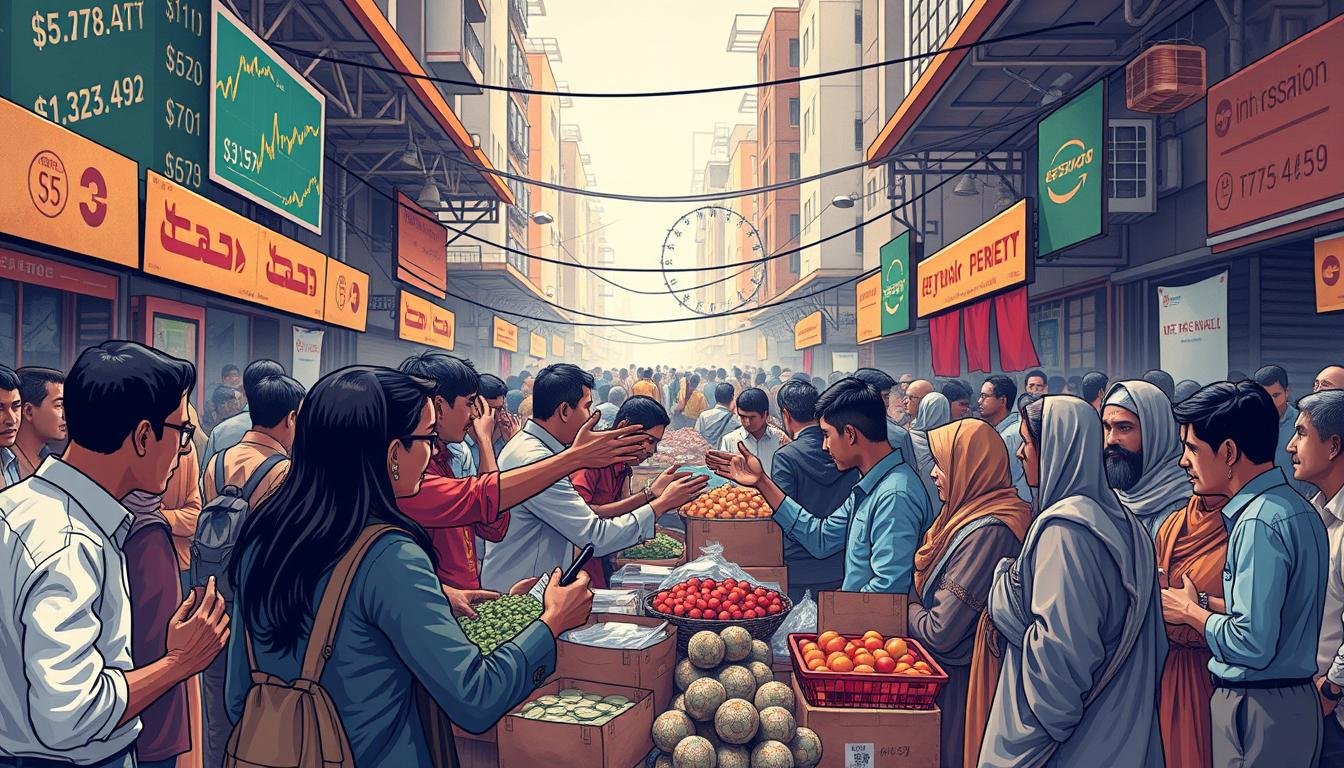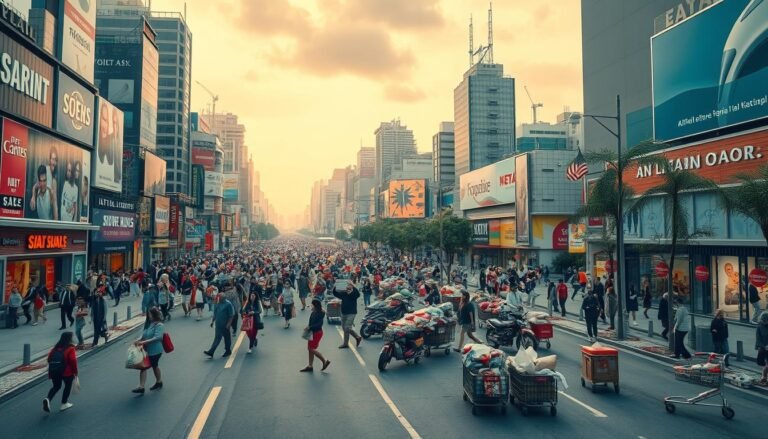The Role of Sociology in Understanding Economic Crises
Ever wondered why economic crises keep happening, even when we try to stop them? It’s not just about economics. Sociology plays a big part too.
Sociological theories help us see how economic systems and human actions are linked. They look at social layers and wealth gaps to show us what drives market trends and financial ups and downs.
Since the 1980s, economic sociology has become its own field. It gives us new ways to think about financial markets. Mark S. Granovetter and Viviana Zelizer are leading thinkers who show how social ties and cultural values affect our money choices.
Uncertainty is a big idea in this area. It’s different from risk, which we can figure out. Jens Beckert talks about it a lot. He says it’s key to understanding how people make choices in financial markets.
Key Takeaways
- Economic sociology emerged in the 1980s as a distinct field
- Uncertainty is a fundamental concept in economic sociology
- Social relationships influence economic behavior
- Cultural norms play a role in shaping financial decisions
- Sociological perspectives offer new insights into market dynamics
Introduction to Economic Sociology
Economic sociology looks at how social structures affect economic behavior. It combines economics and sociology to give us new insights into markets and economic systems. This field shows us how economic downturns affect society and how society and economy interact.
Definition and Scope
Economic sociology looks at the social side of economics. It studies how culture, social networks, and institutions affect economic choices. It says economic behavior isn’t just about making rational choices, but also about social influences.
Historical Development
The study of economic sociology goes back to Karl Marx, Max Weber, and Émile Durkheim. It became a specific field in the 1980s. Since then, many important books have helped shape it:
- 2005: “The Handbook of Economic Sociology” by Neil J. Smelser and Richard Swedberg
- 2010: “Economic Sociology: A Systematic Inquiry” by Alejandro Portes
- 2015: “Re-imaging Economic Sociology” edited by Patrik Aspers and Nigel Dodd
- 2023: “Introduction to the Routledge International Handbook of Economic Sociology” by Milan Zafirovski
Key Figures
Many scholars have greatly contributed to economic sociology:
| Scholar | Contribution |
|---|---|
| Mark Granovetter | Concept of embeddedness |
| Viviana Zelizer | Cultural approach to economic sociology |
| Neil Fligstein | Markets as social structures |
| Pierre Bourdieu | Theory of social capital |
These scholars have shaped economic sociology. They’ve given us tools to study economics through sociology. Their work helps us understand markets and the social effects of economic changes.
The Concept of Uncertainty in Economic Sociology
Economic sociology looks at how society and the economy are connected. At the heart is the idea of uncertainty. This is key to understanding financial crises and economic inequality. Frank Knight first talked about this, showing the difference between risks we can plan for and those we can’t.
Jens Beckert says uncertainty is why we study how people act in the economy. In his 1996 book, he showed how social things like rules and copying others help people deal with the unknown. These things make actions more predictable, helping others in the market too.
Uncertainty leads to different problems:
- Valuation
- Competition
- Cooperation
Akos Rona-Tas and Joel Podolny use this idea in their studies. Harrison White also looks at market structures, showing how uncertainty affects the economy and social groups.
A 2014 study in Sociology stressed the need for working together across fields to understand economic crises. The authors said combining sociology and heterodox economics could challenge the usual economic views. This could help explain complex financial issues better.
“An interdisciplinary approach combining sociology and heterodox economics can provide a more comprehensive understanding of economic uncertainty and its societal impacts.”
This teamwork aims to give a deeper social view of the economy. It tries to overcome the limits of traditional economics in predicting and explaining financial crises. By mixing sociological theories with economic studies, researchers can shed light on how uncertainty affects social groups.
Sociological Perspectives on Market Dynamics
Sociological views on market dynamics give us deep insights into how economies and societies work together. They show us how markets, society, and people interact.
Functionalist Approach to Economic Systems
The functionalist view sees the economy as a well-oiled machine. It believes social layers are key to a society’s smooth running. This idea says economic differences push people to work hard and use resources wisely.
Conflict Theory and Economic Inequality
Conflict theory, based on Marxist ideas, sees the economy as a system that keeps inequality going. It points out how wealth stays with the top class, causing economic and social gaps. This view questions if the market really helps everyone equally.
Symbolic Interactionist View of Economic Behavior
Symbolic interactionism looks at how people interact in economic settings. It talks about career paths and learning, showing us why people make certain economic choices and move through markets.
Recent studies show how these views help us understand market dynamics better:
| Perspective | Key Concept | Impact on Market Analysis |
|---|---|---|
| Functionalism | Social stratification as necessity | Explains role of inequality in market efficiency |
| Conflict Theory | Wealth concentration | Reveals power dynamics in economic systems |
| Symbolic Interactionism | Career socialization | Illuminates individual economic decision-making |
These sociological views give us key insights into market dynamics, economic gaps, and social layers. They help us understand complex economic issues and their effects on society.
The Role of Sociology in Understanding Economic Crises
Sociology is key in understanding economic crises by looking at their social causes and effects. It shows how social structures, institutions, and culture affect economic downturns. Let’s see how sociology helps us grasp these complex events better.
Economic sociology talks about the big role of culture, social ties, and institutions in the economy. It points out the relationships and power struggles that usual economic studies miss.
The 2008 financial crisis made people question neoliberalism. It brought attention to financial markets, income gaps, and wealth differences. This event showed we need sociology to understand economic crises.
Sociological Concepts in Economic Analysis
Jens Beckert, leading the Max Planck Institute for the Study of Societies since 2005, has greatly helped economic sociology. His ideas bring new insights into economic crises:
- Uncertainty in economic decisions
- Fictional expectations in economic actions
- Challenges in valuing, competing, and working together in markets
These ideas show how social factors affect economic actions during crises. They add to traditional economic views.
Social Impact of Economic Downturns
Economic crises deeply affect society. Recent facts show:
| Issue | Statistic |
|---|---|
| Child Poverty (Pre-pandemic) | 1 in 5 U.S. children |
| National Minimum Wage | $7.25 (98 cents in 1968 dollars) |
| Healthcare System | Most expensive among high-income countries |
| African American Experience | Shorter life spans, higher incarceration rates |
These figures show the social effects of economic instability. They prove we need sociology to understand and fix economic crises.
Social Impact of Economic Downturns
Economic downturns change society in big ways. They affect social classes and jobs. The effects are not just about money; they touch communities and people deeply.
Effects on Social Stratification
Economic crises make the gap between rich and poor bigger. In 2020, the rich got richer by $3.6 trillion, but 100 million people became extremely poor. This shows how economic troubles can widen the gap in society.
Changes in Employment Patterns
When the economy goes down, more people lose their jobs. The US had a recession starting in December 2007, and by 2009, many were out of work. Young people in places like Spain and Greece faced over 50% unemployment back then. These changes can affect people’s careers and how they move up in life.
Psychological and Emotional Consequences
Being down economically can hurt people’s mental health. There’s a link between economic troubles and more depression, anxiety, and drug use. When unemployment goes up by 1%, there’s a 0.8% jump in suicides among those under 65. Mental health services get even more crowded during these times, making things worse.
“Economic recessions have detrimental effects on health indicators, impacting both the employed and unemployed.”
It’s important to understand these effects to make better policies. We need to tackle economic inequality and social issues caused by economic downturns.
Cultural Factors in Economic Crises
Economic crises don’t just happen out of nowhere. They are deeply influenced by cultural factors. These factors shape how crises unfold and how people react to them. Societies have unique ways of dealing with financial troubles, based on their values and beliefs.
Argentina is a great example. In 2024, it saw the highest inflation rate in the world. This wasn’t just a number issue. It showed deep cultural views on money and government. Argentinians have learned to live with economic ups and downs, which affects their financial choices.
Sociological theories point out how culture influences risk-taking in finance. In some cultures, taking big financial risks is more common. This can lead to economic highs and lows. Other cultures might focus more on saving, which can help them weather economic storms.
The idea of “fictional expectations” shows how culture guides economic decisions. People act based on what they think will happen, not just facts. These beliefs can make economic predictions come true.
“Economic crises occur regularly in capitalist systems, but their impacts vary across cultures.”
Look at how countries like Georgia use foreign currencies. The US dollar is a big deal there, used for loans and savings. This shows how global trends blend with local habits, creating unique financial scenes.
| Country | Cultural Factor | Economic Impact |
|---|---|---|
| Argentina | History of instability | High inflation tolerance |
| Georgia | Trust in foreign currency | High dollar use in loans/deposits |
| USA | Risk-taking culture | Boom-bust cycles |
Understanding these cultural aspects of economic crises helps policymakers make better decisions. It’s not just about fixing numbers. It’s about working with people’s beliefs and habits for stronger economies.
Globalization and Its Societal Effects on Economic Instability
Globalization has changed our world, linking markets and societies in new ways. This connection brings both good and bad, especially in economic stability.
Interconnectedness of Global Markets
Now, global markets work together more than ever. Goods, investments, and jobs move across borders easily. Trade agreements help with this, affecting economies all over the world. This can make economic problems spread fast, hitting communities far away.
Impact on Local Economies and Communities
Globalization affects local economies in different ways. A study in seven countries showed 48% of people think it helps with quality of life and economic growth. But, only 38% see it helping jobs and workers’ rights. This shows the complex link between global and local economies.
Role of Multinational Corporations
Multinational corporations play a big role in the world economy. They touch local economies, causing worries about jobs and workers’ rights. For example, concerns about European powdered milk imports were shared in Brazil and Tanzania, showing how global trade affects far-off places.
To tackle these issues, we need to invest in education, skills, and technology. These investments help countries and people deal with globalization’s ups and downs. As we face economic instability, understanding these global interactions is key to making good social policies.
Social Movements and Economic Protests
Economic crises often lead to social movements and protests. These forces change market dynamics and challenge the status quo. Sociologists study how economic issues spark collective action.
Studies show that economic troubles make companies more likely to listen to protesters. Protesters use different tactics to pressure economic actors. This explains why industries react differently to social movements.
Social movement studies have grown in sociology. Researchers look at three main theories: resource mobilization, political process, and framing. These theories help us see how groups organize and push for change.
“Social movements have been instrumental in addressing social problems in various countries.”
Worldwide, social movements and protests show their strength. The Arab Spring in 2010 led to big changes in several countries. In Egypt, big worker strikes helped lead to President Mubarak’s resignation.
Social movements keep changing our world. They’ve driven big changes in the US and South Africa. Identity movements, like feminism, aim to empower groups by challenging unfair norms.
- Hundreds of thousands protested for democracy in Egypt
- Time magazine recognized Wael Ghonim as a top influencer in 2011
- The Arab Awakening affected Tunisia, Egypt, and Libya
With ongoing economic challenges, it’s key to understand social movements and protests. These forces will keep shaping our social and economic scenes.
Conclusion
Sociology helps us understand economic crises by looking at how social structures and economic systems work together. This way of analyzing the economy shows us how our financial systems are part of our social lives. From Karl Polanyi’s early work to today’s studies on digital tech, sociology gives us key insights into why we act the way we do in the economy.
Seeing economic crises through sociology shows they’re not just about money problems. They affect our social order and how we connect with each other. For example, how people reacted to sports events in Vancouver – from celebrating to rioting – shows how economic issues can change how we act together. This highlights why we need to think about social factors when making economic policies and handling crises.
In the end, sociology’s role in understanding economic crises goes way beyond just looking at money. By looking at culture, social movements, and how we’re all connected, sociology gives us a fuller picture of economic troubles. This wider view can help us find better and fairer ways to deal with economic problems. It shows the power of combining different fields to understand our complex world.
Source Links
- Sociology 280D
- Sociology, Democracy And The Economic Crisis
- What is Economic Sociology?
- Layout 1
- Economic Sociology: An Overview
- Uncertainty, conventional behavior, and economic sociology
- Accounts Summer 2023 v1
- ANRV316-SO33-06.tex
- ASA ECONOMIC SOCIOLOGY SECTION NEWSLETTER
- Beyond Embeddedness: Economic Sociology as a Historical Theory of Society
- Economic downturns and population mental health: research findings, gaps, challenges and priorities
- The global economic crisis: effects on mental health and what can be done
- The World in Economic Depression: A Marxist Analysis of Crisis
- Crisis of capitalism? Economic crisis? Crisis of economic sociology?
- Discussing the Concept of Crisis in Cultural-historical Activity Research: a Dialectical Perspective – Human Arenas
- 8 How Is Economic Globalization Affecting Inequality? | Understanding the Changing Planet: Strategic Directions for the Geographical Sciences
- Prelims
- The Economics of Movement Success: Business Responses to Civil Rights Mobilization
- Microsoft Word – EmergingSMAug02FinalSP1.doc
- Karl Polanyi and the New Economic Sociology: Notes on the Concept o…
- Economic Sociology
- Chapter 1. An Introduction to Sociology







